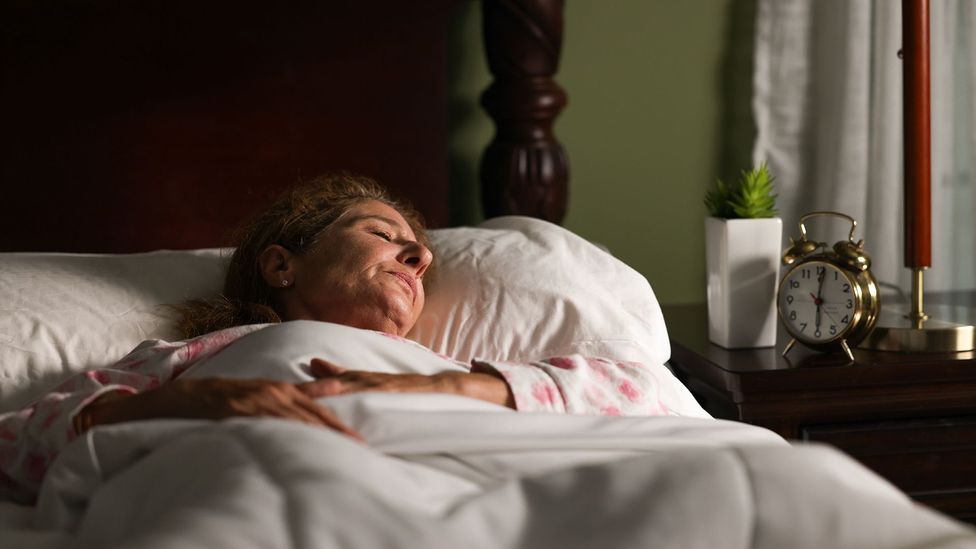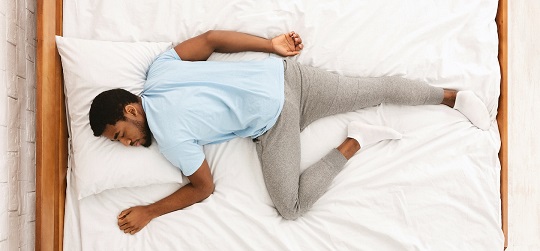If you live anywhere affected by the recent heatwaves, you may well have spent your nights tossing and turning, trying out different sleeping positions in an attempt to get comfortable.
But what does the evidence say about which sleeping positions are actually the best?
Studies on everyone from seafarers on container ships to welders in Nigeria might be able to help us, although given how important sleep is to us it's surprising how few large-scale studies have been conducted.
First you need a way of working out which position people are sleeping in. You can ask them of course, but we only really remember the way we were lying when we were trying to fall asleep and the position we wake up in. To find out more, researchers have tried a variety of techniques including filming people while they sleep or getting them to use wearable technology that monitors their movements.
In Hong Kong researchers are developing what they call the "Blanket Accommodative Sleep Posture Classification System", which uses infrared depth cameras that can detect a person's sleep position even through a thick blanket.
Researchers in Denmark used small motion-sensor detectors attached to volunteers' thighs, upper backs and upper arms before they went to sleep to establish their favoured sleeping position. They found that during their time in bed, people spent just over half their time on their sides, around 38% on their backs and 7% on their fronts. The older the people were, the more time they spent on their sides.
This bias towards sleeping on our sides is something we develop only as we become adults, because children over the age of three spend on average an equal amount of time sleeping on their sides, back and fronts.
Babies, meanwhile, sleep mainly on their backs because they're put in their cots this way for safety reasons.
So sleeping on your side is the most common position and we could trust the wisdom of the crowd to choose the position where they sleep best, but what about the data? A very small observational study in which people could sleep however they preferred found that those who slept on their right side slept slightly better than those on their left, followed by those on their backs.
If you find it easy to sleep on your side, then it's probably also best for anyone else trying to get to sleep nearby. On one occasion, while touring a submarine for a radio programme I was making, the submariners showed me their sleeping quarters, where the bunks were stacked so closely on top of each other that it was hard to turn over. That meant they tended to sleep on their backs, so they told me it was a race to get to sleep first before the whole cabin was full of snoring men.
Another small study looked at seafarers working on merchant container ships and found that respiratory disturbances such as snoring were more common when the seafarers were sleeping on their backs.

Many people find it easier to drop off to sleep on their back - but it doesn't necessarily mean it's the best position to sleep in (Credit: Getty Images)
Some snoring is caused by severe obstructive sleep apnoea, where breathing stops and starts while the person is sleeping. This has been found to be more common in people who consistently sleep on their backs.
By contrast, lying on your side helps to clear the upper airway and prevents the uvula (the fleshy bit that hangs down in the back of your throat) and the tongue from obstructing the throat, leading to less snoring. Indeed, in some cases, a move from sleeping mainly on your back to mainly sleeping on your side has been shown to solve the problem of sleep apnoea altogether.
Sleeping on your side may well have other benefits too. For instance, research into the sleep patterns of welders on container ships in Nigeria showed that those who slept on their back were more likely to suffer back pain, compared with those who slept on their sides.
People who slept in a straighter, more supported side position reported having less neck pain
But this doesn't mean sleeping on your side works for everyone or is a panacea for all aches and pains. It depends on your ailment and the exact position you adopt during sleep. Researchers in Western Australia monitored volunteers' bedrooms for 12 hours a night using automatic cameras and found that those who said they regularly woke up with a stiff neck spent more time sleeping in what the researchers refer to as "provocative side sleeping positions".
This phrase might conjure up all sorts of possibilities in your mind, but what it means in this context is sleeping on your side in a twisted position, for example, with your top thigh reaching across the other thigh, twisting the spine. By contrast, people who slept in a straighter, more supported side position reported having less neck pain.
What the design of this study couldn't ascertain of course is whether sleeping in the "provocative" position was causing the neck pain or whether people were adopting this position because it was the only way they could get comfortable because of neck pain.

Some people – like those serving on submarines – don't even have the option to sleep on their side (Credit: Getty Images)
So how about if you got people to trial a new sleeping position and then followed them to see if it made a difference to the pains they experienced?
In a study conducted with older people taking part in a fitness programme in Portugal, people with back pain were instructed to sleep on their sides and those with neck pain to try sleeping on their backs. Four weeks later 90% of the participants said their respective pains had reduced.
This looks like an impressive result, but there is a caveat. Only 20 people took part in the study – a small sample – so it's not possible to conclude that this simple change of sleeping position would have such a positive effect on everyone who suffers from back or neck pain. As ever in scientific research, more studies are needed.
If you do suffer with heartburn, it might be worth trying to sleep more on your left side in future
For one medical issue, it's not just a question of whether to lie on your back or side, but rather, which side you lie on. In acid reflux, gastric juices come up from the stomach, causing an intense burning in the chest. Sometimes doctors advise people to try sleeping on propped-up pillows in an attempt to relieve this very unpleasant kind of pain.
If the discomfort happens repeatedly it is known as gastro-oesophageal reflux disease, which can have serious consequences. Why this should have happened is not entirely clear, but one possible explanation is that sleeping on the left keeps the junction between the stomach and oesophagus above the level of the gastric acid. Sleeping on the right relaxes the lower oesophageal sphincter, allowing the acid to escape.

Sleeping on one side is the most common psoition - and it also means you're less likely to snore (Credit: Getty Images)
Whatever the answer, if you do suffer with heartburn, it might be worth trying to sleep more on your left side in future.
So far I've concentrated on sleeping on your side or your back because that is what the majority of people do. But what about those people – a small minority – who sleep on their fronts?
Well, to start with, one study suggests it’s not a good idea if you suffer with jaw pain, which is perhaps not very surprising.
And what about wrinkles? Surely, lying with your face squashed into your pillow makes wrinkles worse?
Writing in Aesthetic Surgery Journal, a group of plastic surgeons suggest, rather poetically, that the skin on your face is best preserved if it is treated like "seaweed that sways while tethered to a stalk".
So the idea is to impose the least strain possible on your face while you sleep and that rules out sleeping face down. And if preserving your skin is most important to you than sleeping better or dealing with aches and pains or reflux, then sleeping on your side isn't ideal either.
What then can we conclude from all this? First that, all other things being equal, sleeping on your side seems to have several advantages, but your precise posture can have an effect on neck and back pain – and the side you sleep on can increase or reduce acid reflux. Snoring increases if you sleep on your back, but we all vary so it could still be the way you sleep best.
It's worth trying out new sleep positions and keeping a diary if your current position isn't giving you a good night's sleep. But remember not to obsess too much about different positions or you may keep yourself awake worrying.
BBC





